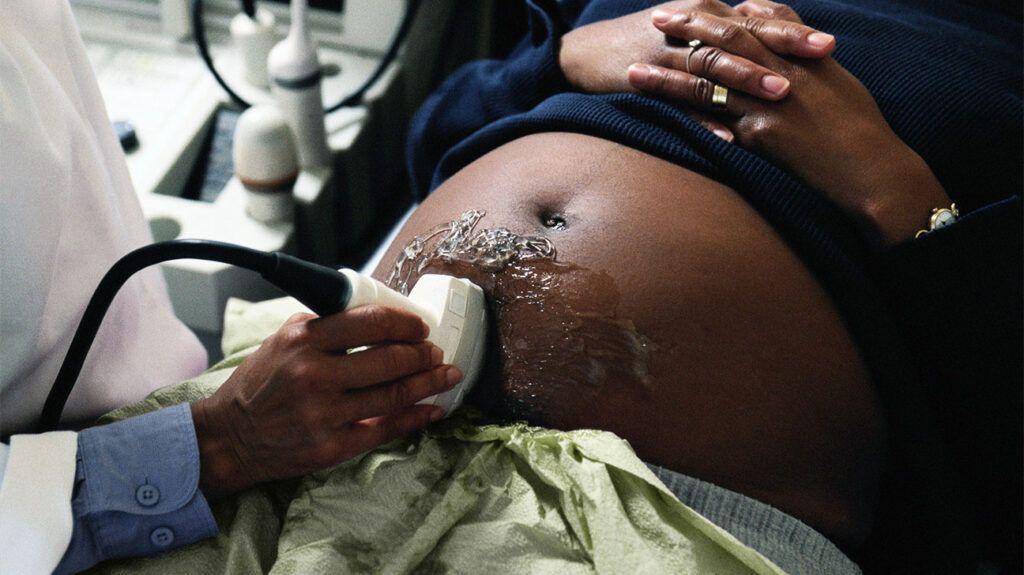Genetic testing and ultrasounds during pregnancy can detect cystic fibrosis (CF) in a fetus. Abnormalities in the bowels and gallbladder can indicate CF.
Cystic fibrosis is a condition in which thick mucus builds up in the body and causes breathing and digestive issues.
This article looks at signs of CF in a fetus during pregnancy and how doctors test for CF in a fetus.
It also discusses the chances of a fetus inheriting CF.

According to a
Fetal bowel hyperechogenicity
Ultrasound imaging of the bowels may appear lighter than usual. The term for this is hyperechogenicity. Echogenicity refers to how bright an image on an ultrasound appears, which can indicate the presence of disease.
Dilated bowel loops
An ultrasound may also show dilated bowel loops. These mean the intestines are wider than usual, and this can indicate bowel obstruction.
This can be a sign of CF, but may also be temporary or benign.
Nonvisualization of fetal gallbladder
Nonvisualization of the gallbladder can be another sign of CF. This means that the gallbladder does not appear on
People can choose to have carrier screening for CF during pregnancy. Carrier screening shows if a biological parent has one copy of the gene that causes CF. For a person to develop CF, they need to inherit two of the CF genes, one from each of their biological parents.
To carry out carrier screening, a doctor will take a blood, saliva, or tissue sample from the inside of the cheek.
The test cannot detect all possible CF genes, but a negative result means there is a very low chance of being a CF carrier. A positive test means a person is a CF carrier. If both parents test positive, there is a chance a fetus may have CF or be a carrier of CF.
A person may not know that they are a CF carrier. If a person is a carrier of the CF gene, they will usually not have any symptoms of CF, or symptoms may only be mild. People who are CF carriers may also have an
Prenatal diagnostic testing can detect CF in a fetus, or if the fetus will be a CF carrier. Doctors can carry out prenatal testing from 10 weeks of pregnancy.
For prenatal diagnostic testing, a doctor will carry out amniocentesis, usually between 15 and 20 weeks of pregnancy, or anytime up until birth.
For amniocentesis, a doctor will use a fine needle to take a small sample of amniotic fluid for laboratory testing to examine the cells for the CF gene.
Prenatal diagnostic testing also includes chorionic villus sampling (CVS). A doctor takes a small tissue sample from the placenta for laboratory testing to check for the CF gene. People may have CVS between 10 and 13 weeks of pregnancy.
If people are using in vitro fertilization (IVF), medical professionals will perform genetic testing on an embryo before transferring the embryo to the uterus.
Results from ultrasounds in the
CF occurs due to a mutation in the cystic fibrosis transmembrane conductance regulator (CFTR) gene.
A person needs to inherit mutations in two copies of the CFTR gene, one from each biological parent, in order to have CF.
A person is a carrier of CF if they only have one copy of the genetic mutation, rather than two. Around 10 million people are CF carriers in the United States.
If both parents are CF carriers, the chance of passing on CF is as follows:
- 25% chance a child will have CF
- 50% chance a child will not have CF but will be a carrier of CF
- 25% chance a child will not have CF and will not be a carrier of CF
If a person with CF and a carrier of CF have a child together, the chance of passing on CF is:
- 50% chance a child will have CF
- 50% chance a child will not have CF but will be a carrier of CF
This section answers some frequently asked questions about the signs of CF in a baby.
What are the first signs of cystic fibrosis in babies?
If a baby has CF, they may have the following symptoms, which can be mild or more severe:
- salty-tasting skin
- wheezing or coughing
- shortness of breath
- lung infections
- abnormal bowel movements
- poor growth
All newborns will have screening tests for CF. A doctor will take a small sample of blood from the heel of the baby’s foot. Laboratory testing then examines the blood for CF genes.
If test results are abnormal, the baby may require further diagnostic and genetic testing. Doctors may do a sweat test, which measures salt levels, as CF increases the amount of salt in sweat.
Are babies born early with CF?
A 2018 study found that it was more likely for babies with CF to be born preterm, and they were more likely to have lower birth weights than babies without CF.
Genetic testing and ultrasounds during pregnancy can detect if a fetus has CF or is a carrier of CF.
All newborns also have screening after birth to test for CF and other genetic conditions.
